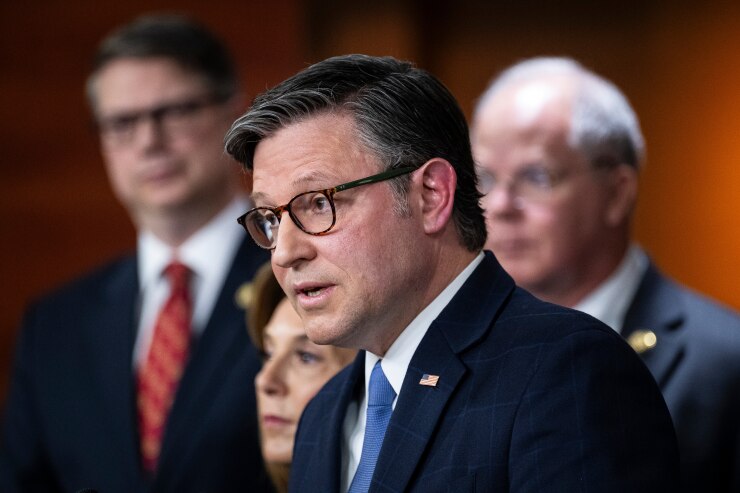President Donald Trump decamped to his Mar-a-Lago resort in Florida late Tuesday for the Thanksgiving holiday with any effort to control spiking health care premiums — a key issue for Republicans whose economic appeal to voters has waned since last year's election — still very much in flux.
Trump, speaking to reporters aboard Air Force One, distanced himself from a White House trial balloon floated earlier this week that would have seen the extension of expiring Obamacare subsidies in exchange for new eligibility limits and other concessions.
"Somebody said I want to extend them for two years — I don't want to extend them for two years. I'd rather not extend them at all," Trump said. But, in the same breath, the president conceded that "some kind of an extension may be necessary to get something else done."
Such is the quandary facing the president and lawmakers when they return from their holiday next week. They risk the wrath of millions of Americans, some of whom will see their premiums double or triple starting Jan. 1 when the Covid-era assistance program ends, at a time when rising prices continue to prove a political liability.
Republicans are divided on whether to extend the popular premium tax credits, loathed by the GOP's right flank because of the costs and their lingering opposition to former President Barack Obama's signature legislative achievement. But some 24 million Americans receive their health care through the Affordable Care Act and the subsidies
Democrats have forced the issue, putting the pandemic-era tax credits at the center of their demands during the historic 43-day government shutdown. They didn't succeed on the extensions, but their demands put pressure on Republicans, for whom health care has long been a thorny problem.
Late Sunday, a rough outline of a White House proposal to extend the tax credits for two years and impose new income caps and minimum premium payments leaked to news outlets, blindsiding many congressional Republicans, who had been cooking up alternative plans to address rising health care costs.
Trump previously railed against the tax credits, which go to insurance companies to offset the costs of premiums, and vowed to let them expire, saying Congress instead should send payments directly to patients. The White House plan did include a minimum premium payment, a longstanding desire of some conservatives, as well as an option for enrollees to receive part of their credit in a tax-advantaged savings account.
That idea appeared intended to satisfy Trump's call to give money to taxpayers directly rather than insurance companies — an idea he reiterated when speaking en route to Palm Beach.
"I like my plan the best. Don't give any money to the insurance companies," Trump said. "Give it to the people directly, let them go out and buy their own health care plan, and we're looking at that."
Trump declined to say who he was speaking with about his idea, but did say he believed "a lot" of Democrats supported his idea.
"Democrats are negotiating with me. It's very interesting," Trump said. "They want to see something happen."
Further complicating matters for Republicans heading into the midterm election cycle are widespread concerns among voters about
Absent congressional action to extend the subsidies, Obamacare premiums on average will increase 114% next year, according to KFF, a nonpartisan health researcher.
Still, the botched rollout of Trump's initial plan illustrates the difficult task ahead for Republicans.
House Speaker Mike Johnson, conscious of conservatives' firm opposition to the subsidies, warned the White House there's little interest in extending the subsidies among House Republicans, according to a report by the Wall Street Journal, citing anonymous sources. Johnson's office would not confirm the conversation, though Johnson has repeatedly declined to commit to holding a vote to extend the subsidies.
Still, Republicans' moderate Main Street Caucus issued a statement Tuesday praising Trump's ongoing effort to reform and extend the enhanced premium subsidies.
Reactions from Democrats to the leaked White House plan were mixed. Senators Jeanne Shaheen and Maggie Hassan, who have pushed for a bipartisan deal to extend the tax credits, welcomed the reported plan as a starting point for negotiations.
It was less popular among others. The top House Democrats on three committees with jurisdiction over health care policy rejected the leaked plan in a joint statement, calling anything short of a clean extension of the tax credits "unworkable."
If the White House formally releases a proposal, it will need the support of at least seven Democrats in the Senate to pass. Democrats' support will also likely be needed in the House for a compromise, if it comes together, given the opposition from the right.






